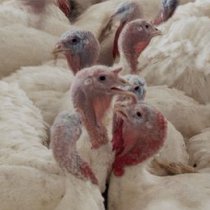Avian metapneumovirus in the USA
In the United States of America (USA), avian metapneumovirus (aMPV) causes an upper respiratory tract infection in turkeys; no outbreaks have been reported in commercial chicken flocks. Typical clinical signs of the disease in turkey poults include coughing, sneezing, nasal discharge, tracheal rales, foamy conjunctivitis and swollen infraorbital sinuses. The virus also causes a rapid drop in egg production in breeding and layer turkeys. The disease is usually accompanied by secondary bacterial infection that can increase morbidity and mortality, resulting in significant economic losses to the turkey industry.
aMPV is a member of the genus Metapneumovirus within the subfamily Pneumovirinae of the family Paramyxoviridae. Although only one serotype of aMPV has been described, aMPV isolates have been classified into four subgroups, A, B, C, and D, based on the level of genetic variations and antigenic differences. While the aMPV subgroups A and B are present in Europe and most countries in the world, excluding the USA, aMPV-C is mainly present in the USA and has been reported to a limited degree in France and Korea. Currently, the aMPV subgroup D has only been reported in France.
Although outbreaks due to aMPV infection in turkeys have been reported since 1970s, the virus was not identified in the USA until 1996. The first outbreak occurred in the state of Colorado. This outbreak was restricted to one large commercial turkey operation. With careful management, the virus was quickly eradicated from this operation. A few months later, the virus appeared in Minnesota. Since its first detection in 1997, aMPV has become endemic in Minnesota and the surrounding states. A number of aMPV isolations were made from the turkeys and wild birds in the endemic area. Molecular analysis of these viruses has shown that the USA isolates of aMPV are genetically and antigenically different from their counterparts, aMPV-A and aMPV-B, which circulated Europe and other parts of the world. Thus, the USA isolates are classified into a new subgroup C (aMPV-C). To prevent the disease caused by aMPV-C infections, a live, attenuated vaccine has been developed and used in the endemic area. Fortunately, since the use of the live attenuated vaccine plus the practice of restricted biosecurity measurement in the endemic area, the incidence of aMPV-C outbreaks has declined. At the present time, there are no reports of aMPV-C outbreaks in commercial turkeys in the USA. However, serologic surveillance shows an occasional positive for aMPV-C antibody in turkey breeders in Minnesota and the neighboring states.
For current incidence and control measures in the USA, follow the links in the left menu.
This information is supplied by Dr. Qingzhong Yu.

aMPV causes a respiratory
infection in turkeys and chickens of all ages.

